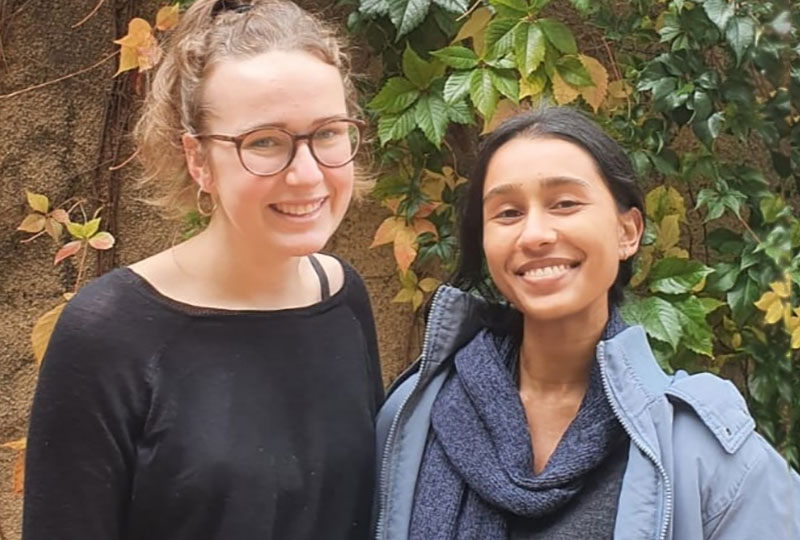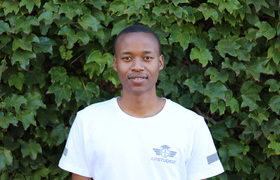EBE students score in stock exchange challenge
07 June 2022 | Story Chris Mitchell. Read time 5 min.
Two University of Cape Town (UCT) engineering students used their analytical powers to participate in the annual Johannesburg Stock Exchange’s (JSE) Investment Challenge, bagging the monthly prizes for March and April.
Shreya Gopaulsingh and Megan Greggor have won the “Speculator portfolio for universities” category for two months in a row and shown great aptitude in looking at the prevailing investment environment to predict future scenarios in the national challenge.
The annual JSE Investment Challenge is the exchange’s flagship youth corporate social investment programme that aims to teach South African learners and students about investing on the JSE and the larger role that such investment plays in the country’s economy.
Through the challenge, participants get to test their share trading skills through a simulated “ghost trading” programme. Each team is given a virtual sum of R1 million to invest in JSE-listed shares, their performance is tracked and measured against other teams taking part in the challenge.
‘Queen of Mechanics’
Gopaulsingh and Greggor, who are both second-year mechanical and mechatronics engineering students, have dubbed their partnership “Queen of Mechanics” in a nod to their academic paths.
Gopaulsingh explained that their strategy was to be agile and to quickly adapt to new information as the challenge runs for a relatively short time, so trading has to be applied with this in mind.
“Markets are currently being influenced by a range of factors and data. Therefore, it is important to stay in touch and adjust accordingly. Our first trades were future trades in the beginning of April. The data and the environment seemed to suggest a short-term negative impact on financials was looming. We were able to profit from a decline in the share prices of a range of financial service providers soon after,” said Gopaulsingh.

Greggor paid tribute to Gopaulsingh as being the brains behind their strategy, which anticipated the impact of COVID-19 on the economy.
“I think what we did differently from the other teams was to focus more on buying futures than trading stocks, although I think a bit of luck was also involved!” she quipped. “We knew the economy had taken a huge hit during the lockdown and this meant inflation was bound to go up.”
Futures are a type of financial product that fall within the broad category of financial instruments called derivatives. A futures contract effectively binds two parties – buyer and seller – to transact at a premeditated future date and price.
Challenge and reward
“We knew that the bank stock prices would go down, then we looked at other companies that were related and depended on each other and anticipated parallel effects. We took out several futures that claimed that the stocks would go down, and they did!” Greggor added.
Gopaulsingh has been participating in the challenge since Grade 8 and has won prizes when she was in high school. “My dad was involved in the JSE and this led to me being inspired to understand what went on in the financial world,” she said.
“Although it does require expertise to master, the basics of trading are not something out of reach for the average person.”
“I enjoy being able to predict and forecast what might happen in the markets, based on what goes on currently and trying to see patterns between seemingly unrelated events and how they just might affect the stocks.”
Gopaulsingh said that while participating in the challenge hasn’t had a direct impact on her studies, it has positively influenced her decision making in general. “I used to think that trading was something highly analytical and not for me, as I was not studying anything in finance, but now I see that although it does require expertise to master, the basics of trading are not something out of reach for the average person.”
Greggor added: “I think it is important to get involved in trading and understanding what it is and how it works, because so many of our daily decisions and actions are affected by what goes on in the financial world. I would definitely recommend this to other students, in the finance field or not.”
The Investment Challenge ends on 23 September 2022. The winners of the monthly challenges receive R3 000, while the annual winners will receive R25 000 as well as a trip to an international stock exchange.
 This work is licensed under a Creative Commons Attribution-NoDerivatives 4.0 International License.
This work is licensed under a Creative Commons Attribution-NoDerivatives 4.0 International License.
Please view the republishing articles page for more information.










